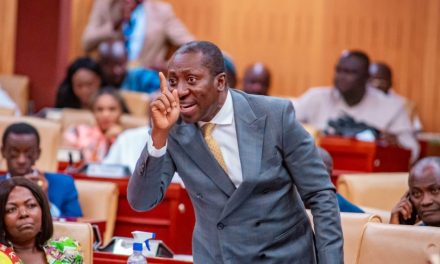About 25 Civil Society Organizations affiliate to the West Africa Action Network on Small Arms (WAANSA-Ghana) has called on Mr. Henry Quartey, Minister of the Interior, to prioritize approval of the Arms Trade Treaty (ATT) Implementation Cabinet Memo and the passage of the National Arms Commission Bill, 2023.
The call was made in a statement signed on behalf of the CSOs by Mr. Ken Kinney, WAANSA-Ghana President, at the end of three-day capacity-building session for about 25 civil society organisations connected to WAANSA-Ghana in Abokobi, near Accra, on the Saving Lives Entity (SALIENT) Project administered by the UN Systems in Ghana.
The treaty seeks to establish the highest possible common international standards for regulating or improving the regulation of the international trade in conventional arms, prevent and eradicate the illicit trade in conventional arms, and prevent their diversion.
It also seeks to contribute to international and regional peace, security, and stability; reduce human suffering; and promote cooperation, transparency, and responsible action by States Parties in the international trade in conventional arms, thereby building confidence among States Parties
The National Arms Commission Bill, 2023, aims to regulate and manage arms, ammunition, and other related materials in the country, control the proliferation of small arms and light weapons, improve safety and security, and protect lives and property in the country.
The CSOs emphasized the urgent need for the bill to be passed into law to ensure effective control and regulation of small arms.
According to WAANSA Ghana, the passage of the National Arms Commission Bill 2023 into law as well as the Cabinet’s approval of the ATT implementation memo are crucial in addressing the root causes of insecurity and violence in Ghana and preventing the illicit trade in arms.
The CSOs acknowledged the enthusiasm with which the Minister worked to sanitize Accra in his previous portfolio as the Greater Regional Minister and urged him to work closely with stakeholders to ensure that the Cabinet Memo
on ATT Implementation, which Ghana signed and ratified nine years ago, is approved and paves the way for the National Arms Commission bill to be passed into law without delay.
WAANSA Ghana also highlighted the need for increased public awareness and education on the dangers of small arms and light weapons.
The CSOs appealed to the government to collaborate with stakeholders to promote peace and security in Ghana, especially with the approach of the December 2024 general elections.
WAANSA Ghana emphasized that the fight against small arms and light weapons requires a collective effort from all stakeholders and expressed its willingness to work with the government and other partners to ensure that Ghana becomes a safer and more secure country for all citizens.
Ghana is the third African country to benefit from the first phase of the SALIENT Trust fund, which is being spearheaded by the United Nations Office for Disarmament Affairs (UNODA), the United Nations Development Programme (UNDP), and the United Nations Office for Drugs and Crimes (UNODC).
Ghana is a signatory to the Economic Community of West African States (ECOWAS) Convention on Small Arms and Light Weapons, which calls for the establishment of National Commissions to provide an effective regulatory mechanism for small arms and light weapons.
The SALIENT project aimed to address armed violence and illicit small arms and light weapons trafficking, emphasizing a comprehensive approach to sustainable security and development.
The project seeks to upscale efforts towards the passage of the bill into law to provide the necessary tools and mechanisms to effectively regulate the trade, possession, and transfer of small arms and light weapons.
The SALIENT project is being implemented in Ghana by WAANSA-Ghana, the National Commission on Small Arms and Light Weapons, and the Kofi Annan International Peacekeeping Training Centre.
The CSOs affiliated with WAANSA-Ghana, the West Africa Network of Journalists for Security and Development, the Care-Love Charity Foundation,
and Youth for Peace and Security in Africa, are undergoing advocacy skills development to campaign for a review of Ghana’s outdated arms control laws.
The rest are the Foundation for Security and Development in Africa, the Orphans and Widows Association, the Security Warehouse, West Africa Lead, the Nurture Nature Foundation, the Centre for Rural Women in Peace, Security, and Development, Greater Accra Youth Network, BADEC, and Nutifafa Foundation.
The others are the West Africa Action Network on Small Arms (WAANSA-Ghana), the Jatikay Centre for Human Security and Peace Building, the West Africa Centre for Violent Extremism, the Association of Ghanaian Women and Child Welfare, and the Centre for Democratic Development Ghana.
By Francis Ameyibor




